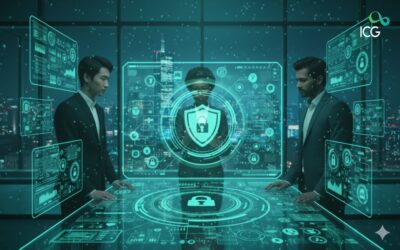The world is witnessing a rapid and profound digital transformation, driven by emerging technologies such as artificial intelligence (AI), blockchain, smart cities, and metaverse. These technologies are creating new opportunities and challenges for different sectors, such as education, health, entertainment, finance, and governance, both in the Middle East and North Africa region and globally.
Why Do They Matter?
AI: Enables machines to perform tasks requiring human intelligence, improving service/product quality, efficiency, and accessibility. AI addresses critical issues like unemployment, poverty, illiteracy, and environmental degradation.
Blockchain: A secure, transparent ledger technology that facilitates trust and efficiency in transactions and data management. It enhances trust, accountability, and efficiency in various domains, such as supply chain management, digital identity, and beyond, empowering individuals in unstable political climates.
Smart Cities: Urban centers use technology to improve living conditions, sustainability, and infrastructure efficiency. These cities help optimize the use of resources, such as energy, water, and waste, and enhance public services, fostering innovation and community inclusion.
Metaverse: A collective virtual space offering immersive, interactive experiences across various platforms. It revolutionizes entertainment, education, and social interaction, overcoming physical world limitations like distance, language, and discrimination.
These technologies are not only reshaping the way we live, work, learn, and play, but also the way we interact, communicate, and collaborate. They are enabling new forms of value creation, exchange, and distribution, as well as new models of governance, regulation, and participation. They are also challenging the existing paradigms, norms, and institutions that have been established in the previous eras of the internet.
Investment and Adoption Trends

The MENA region is not only a consumer but also a producer and innovator of these technologies. Several countries and companies in the region have been investing and experimenting with AI, blockchain, smart cities, and metaverse, aiming to become regional and global leaders in the digital economy.
For example, Saudi Arabia has embraced these technologies through initiatives like Saudi Vision 2030, the National Strategy for Data and Artificial Intelligence, and the Digital Cooperation Organization, as well as through the NEOM smart city project. The Kingdom has engaged in partnerships and collaborations with various stakeholders and experts to foster the advancement and application of these technologies. Specifically, the NEOM project, situated along the Red Sea, signifies a $500 billion investment, focusing on deep technology and metaverse initiatives. Notably, the metaverse is anticipated to contribute up to $38.1 billion to Saudi Arabia’s economy by 2035.
Another example is the United Arab Emirates (UAE). They launched several initiatives and projects to promote and implement emerging technologies, including the UAE Strategy for Artificial Intelligence, the Dubai Blockchain Strategy, the Smart Dubai initiative, and the Dubai Future Foundation. In addition to these developments, the UAE has hosted and supported various events and platforms to showcase and celebrate these technologies, such as Expo 2020 Dubai, the World Government Summit, and the Museum of the Future. In a significant move, UAE Metaverse Technology Holdings announced an investment of $54.5 million in utility-based metaverse cities, allowing users to virtually experience Dubai and Abu Dhabi’s key attractions and urban life. Furthermore, the Dubai Metaverse Strategy aims to contribute $1 billion to the national economy over five years and supports the creation of 40,000 virtual jobs.
Qatar as well is actively investing in smart city infrastructure and emerging technologies, demonstrating its dedication to becoming a leader in technology and innovation within the region, with a clear focus on sustainable and smart urban development. Here are some key figures and initiatives:
· Qatar Free Zones Authority (QFZA) is focusing on attracting, partnering, and investing in global companies to build technology clusters to support the country’s goals.
· Qatar is developing two major smart cities of the future: Msheireb Downtown, a mixed-use district with a $5.5 billion investment covering 31,000 square meters, and Lusail City, a $45 billion smart city covering 38 square kilometers.
· The country is committed to clean energy, smart transportation, and eco-friendly logistics, with plans to fully electrify the public transportation system by 2030.
· Qatar’s smart city development offers diverse opportunities across the smart city supply chain, including mobility, urban planning, energy and environment, security and control, social and public services, and smart governance.
Other countries in the region have also been active and ambitious in pursuing and leveraging these technologies, such as Egypt, Jordan, and Bahrain.
Globally, these technologies are also gaining momentum and traction, as more and more players are entering and exploring the space, such as governments, corporations, startups, nonprofits, and individuals. Some of the notable examples are:
- The European Union, which has been promoting the ethical and human-centric use of AI and blockchain, has launched several initiatives and projects, such as the European AI Strategy, the European Blockchain Partnership, the Smart Cities and Communities European Innovation Partnership, and the Digital Euro.
- Facebook, which has rebranded itself as Meta, has announced its vision and strategy to build and connect the metaverse, as well as its products and platforms, such as the Horizon Worlds.
- Microsoft has also unveiled its metaverse ambitions and plans, as well as its products and platforms, such as the Mesh, the HoloLens 2, and the Azure.
- Other tech giants, such as Google, Amazon, Apple, and Tencent have also been developing and offering various solutions and services related to AI, blockchain, smart cities, and metaverse.
Prospects and Pitfalls of These Technologies
These technologies can bring many benefits to both individuals and organizations, such as:
- Increased productivity and efficiency: By automating, optimizing, and enhancing various tasks and processes, these technologies can help improve the performance and output of individuals and organizations, while also reducing costs and errors.
- Enhanced creativity and innovation: By enabling new forms of expression, experimentation, and exploration, these technologies can help unleash the potential and talent of individuals and organizations, while also fostering a culture of learning and improvement.
- Improved engagement and satisfaction: By providing more personalized, immersive, and interactive experiences, these technologies can help increase the motivation, value, and empowerment of individuals and organizations, while also enhancing their sense of autonomy, ownership, and achievement.
- Higher inclusion and diversity: By connecting and empowering more people and communities, these technologies can help increase the access, participation, and representation of individuals and organizations, while also promoting their rights, interests, and values.
However, these technologies also pose some risks and challenges, such as:
- Ethical and social implications: These technologies can raise some moral and societal issues, such as privacy, security, fairness, accountability, and transparency, as well as the impact on human dignity, identity, and agency.
- Legal and regulatory uncertainties: These technologies can create some legal and regulatory gaps and conflicts, such as the definition, ownership, and protection of digital assets, the jurisdiction and enforcement of laws and rules, and the governance and oversight of platforms and services.
- Economic and environmental consequences: These technologies can have some economic and environmental effects, such as the distribution and redistribution of wealth and power, the creation and destruction of jobs and markets, and the consumption and conservation of resources and energy.
Therefore, it is important to ensure that these technologies are used in a responsible, inclusive, and sustainable manner, that respects the values, rights, and interests of the people and the planet. This requires a collaborative and multi-stakeholder approach, involving the government, the private sector, civil society, academia, and media, as well as regional and international cooperation and coordination.
By leveraging these technologies, the MENA region can harness its unique opportunity and potential to create a better and brighter future for its people and the world.








